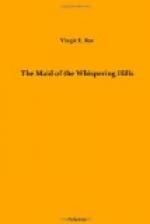In the midst of it McElroy looked stupidly at De Courtenay.
“For the love of God!” he said, “why did you not run?”
“Why didn’t you?”
The cavalier was laughing.
“I could not, M’sieu,” he added; “the charm of the hazard was too great.”
And that was the last word he offered the man who would have delivered him, turning to face the savages.
“Dogs!” he cried in French; “dogs and sons of dogs!”
Stooping suddenly, he snatched a horned headdress from the crown of an aged medicine man, scooped it full of glowing brands, and tossed its contents straight into the wild faces before him.
Then he straightened, crossed his arms, and smiled upon them in contempt.
Pandemonium was loose.
In breathless swiftness the captives were stripped to the skin, tied hand and foot, and fastened to stakes set hastily up on either side the fire.
“It begins to look, M’sieu,” called De Courtenay, across the space and the roaring flames, “as if the Nor’westers and the Hudson’s Bays must scratch up a new wintering partner and a fresh factor,—though, ’ods blood! this one is fresh enough! Will they cure us as as they have Negansahima?”
At mention of the dead chief a dozen missiles cut the night air and struck the speaker. One, a lighted torch, landed full in his face, and McElroy groaned aloud.
If De Courtenay hoped by his taunts and his jeers to reach a swifter end, he was mistaken in that hope. No fire was kindled at their stakes, no sudden stroke of death maul or tomahawk followed his words. The Nakonkirhirinons had keener tortures, torments of a finer fibre than mere physical suffering, and the Bois-Brules’ liquor had stirred the hidden resources.
Again the dancing commenced, but this time it was not the harmless measure of the stamp-dance. Instead of the bending bodies, the rhythmic stamping of soft-shod feet, the extended palms, there were unspeakable leapings, writhings, and grimaces revolting in their horror, brandishing of knives, and yelling that was incessant.
McElroy closed his eyes and forced his mind to the Petition for Mercy.
Through the tenor of the beautiful words there cut from time to time De Courtenay’s voice, cool, contemptuous, a running fire of invective, now in French, now in English, and again in the Assiniboine tongue, which was familiar to the Nakonkirhirinons, they being friends with that tribe.
As the hubbub rose with the liquor two slabs were brought, rough sections of trees hastily smoothed with axe and hatchet, of the height of a man and the thickness thereof, with a slight margin at top and sides. These were set up behind the stakes that held them, thus forming a background, and the two naked forms stood out in the firelight like pictures in white frames.
A wise old sachem, hideously painted, drew a line on the ground at thirty feet, facing the central fire, and with a bony finger picked out a certain number of warriors.




